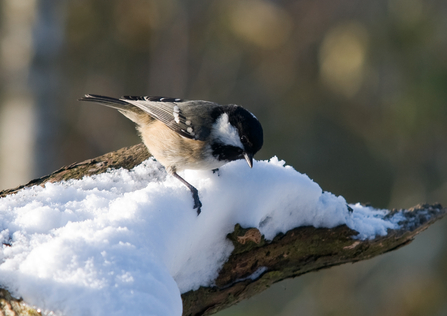
Coal tit in the snow © Bob Coyle

Coal tit in the snow © Bob Coyle
Most garden wildlife will still be hibernating in February but bumblebees or hedgehogs that have emerged early in mild weather may be spotted. They will have gone without food for months, and will be hungry, so a bowl of meat-based dog or cat food for hedgehogs and, if the budget stretches to it, a pot of early flowering crocuses or primroses will feed bumblebees.
Everyday items found in kitchen cupboards such as suet, peanuts, seeds, apples and dried fruit will really help many birds and other small mammals survive if placed in the garden. Bread is not the best thing to put out but is better than nothing.
A bowl of fresh water will also be very welcome. A washing up bowl full of water will enable birds to have a bath to keep their feathers free of dirt. Placing a tennis ball into the bowl will prevent ice forming as the it will float on the water’s surface, with even the slightest breeze causing it to move with the motion and thereby preventing ice from forming across the water.
Likewise, anybody with a bird bath is encouraged to keep them clean and ice-free by adding warm water regularly.
February is also an ideal time to clean out garden nest boxes to make way for birds that usually start looking for places to raise their young in mid-February. It’s never too early to install a new nest box - a spot facing north-east is the best option.
Even if conditions are mild this February, avoid tidying the garden as often the best course of action for wildlife is to do nothing!
Something as simple as leaving a pile of stones, deadwood or logs undisturbed in a quiet corner can provide vital home for insects, as well as a convenient buffet for frog, birds, and hedgehogs.
Similarly, bugs and insects will also hibernate in dead stalks and among fallen leaves - so avoid clearing from gardens too much before the end of March, as tempting as it might be. Also, turning the compost heap until late March as frogs, small mammals and insects may be hibernating within them and any disturbance could harm them.
Jennifer Care, Northumberland Wildlife Trust Estates Officer says:
“At this time of year, you never know what might be hiding in the undergrowth in your garden so avoid cutting, strimming, raking or tidying. You never know, you may be saving an animal’s life or preventing its home from being destroyed.
"And, if you are thinking about what to plant in your garden once spring arrives, why not think about plants that pollinators love such as lavender, dahlias and marigolds.”